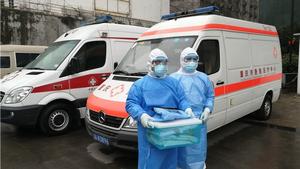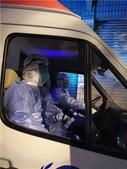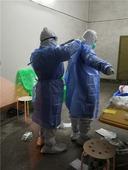 Doctor Wen Yongsheng (left) and driver Yang Bo stand by their ambulance in Chongqing. (PHOTO PROVIDED TO CHINA DAILY)
Doctor Wen Yongsheng (left) and driver Yang Bo stand by their ambulance in Chongqing. (PHOTO PROVIDED TO CHINA DAILY)
Even in his sleep, Wen Yongsheng was expecting the call. It immediately woke him up. He answered it but he knew before he said a word what it was about. He jumped into action and, along with his partner, Yang Bo, donned full protective clothing.
As a doctor and driver of an ambulance, they just received a request to transfer a patient infected with the novel coronavirus to a designated hospital in Southwest China's Chongqing.
The transfer of critically-ill patients can be a very dangerous task. But I can’t show any panic or fear. I need to make the patients feel reassured
Wen Yongsheng, doctor, Chongqing Emergency Medical Center
They had been trying to get some precious sleep. After all, they had been working flat out for 12 days since Jan 24, Lunar New Year's Eve.
"We have to seize every minute and second to have a rest," says Wen, a doctor with the department of the pre-hospital first aid department at the Chongqing Emergency Medical Center.
Wen said they worked for nearly 16 hours-going out for three times and transferred 14 confirmed patients to the designated hospital on Feb 2.
On Lunar New Year's Day, he "celebrated" his 40th birthday on duty.
Their ambulance has an inbuilt negative-pressure chamber, allowing air in but not out. This prevents cross infection and the possibility of spreading the virus.
Wen always sits beside the patient and uses life support equipment to ensure that the patient's condition does not deteriorate on the way to hospital.
"The transfer of critically-ill patients can be a very dangerous task. But I can't show any panic or fear. I need to make the patients feel reassured," says Wen.
 Wen (left) and Yang on a trip to transfer patients to a hospital. (PHOTO PROVIDED TO CHINA DAILY)
Wen (left) and Yang on a trip to transfer patients to a hospital. (PHOTO PROVIDED TO CHINA DAILY)
Once they put on disposable protective clothing, they wear it for four to five hours and then disinfect the vehicle. They drink little water to avoid visiting the bathroom.
Wen, who started working at the department in 2002, still remembers the fight against SARS, or the severe acute respiratory syndrome, in 2003.
"In those days, the older doctors volunteered to take on the heaviest tasks. I am an older one now. I should also take the initiative," he says.
According to Cai Pingjun, head of Wen's department, the hospital has two negative-pressure ambulances as well as two pairs of doctors and drivers to transfer confirmed patients to the designated treatment center.
Since the first case was transferred to the Chongqing Emergency Medical Center on Feb 4, the two special ambulances have transferred 91 confirmed patients. There were no reported cases of cross-infection.
 Wen (left) helps his colleague put on a protective suit. (PHOTO PROVIDED TO CHINA DAILY)
Wen (left) helps his colleague put on a protective suit. (PHOTO PROVIDED TO CHINA DAILY)
The doctors and drivers of the special ambulance live in an isolated area of the hospital while carrying out their duty. After 14 days at work, they are quarantined in the isolation area for another 14 days before they can go back home.
Wen finished his first two-week stint on Friday. At the moment, he can only communicate with his family through video call.
"My wife always tells me she will support me forever. My 6-year-old son always says he misses me. I also miss them very much," Wen says.
In order to win the battle against the virus, Wen says he can overcome the difficulties.
"I really hope it ends quickly. I want to go home early and hold my little boy," he says.
He Lei contributed to this story.
Contact the writers at zhangxiaomin@chinadaily.com.cn


